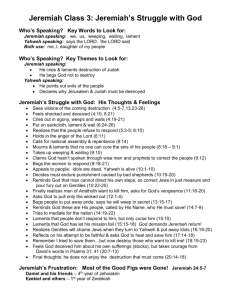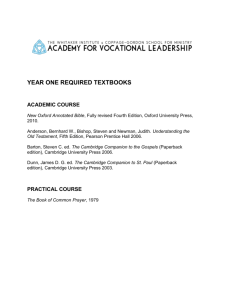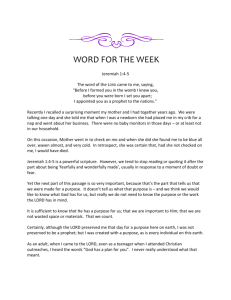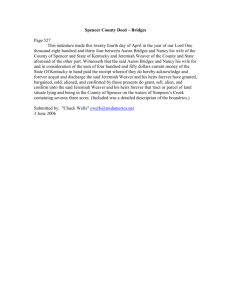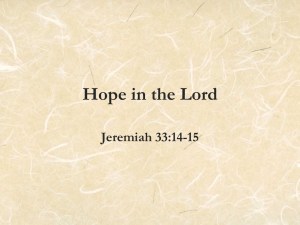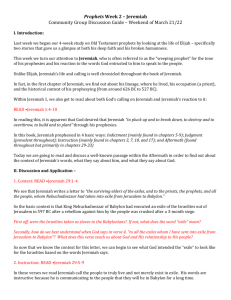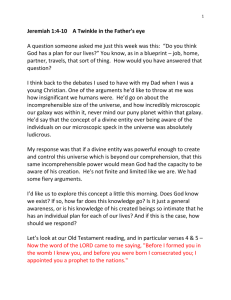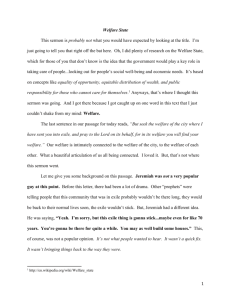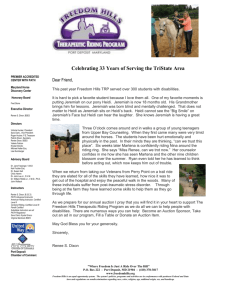Jeremiah's discernment and articulation of the freedom and pathos
advertisement
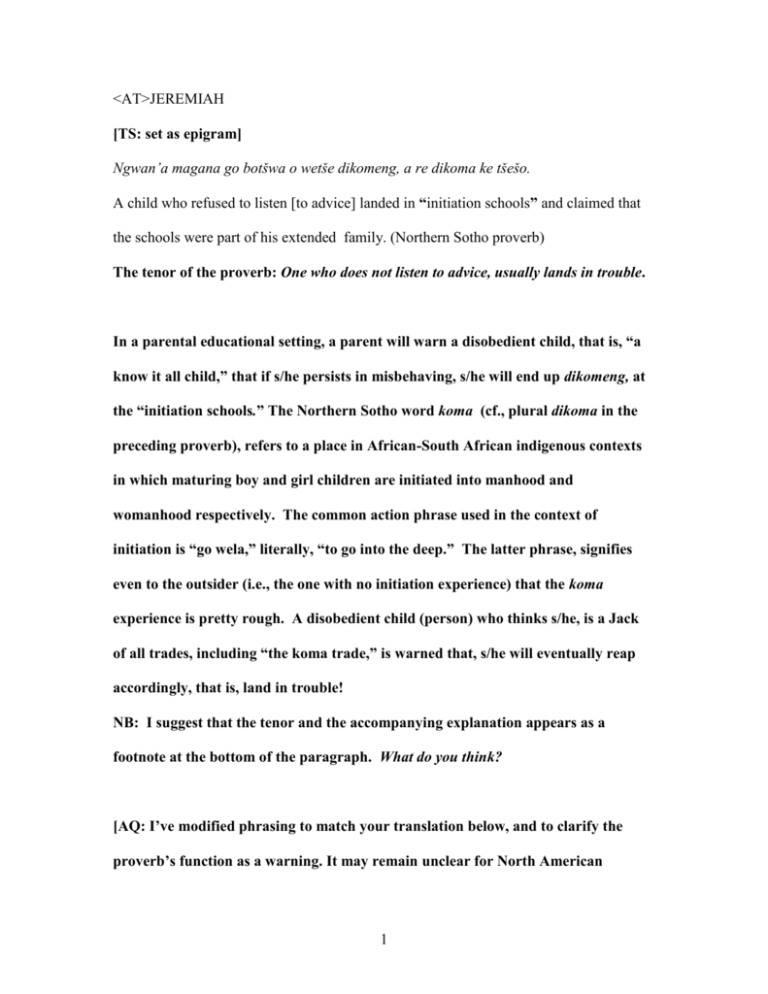
<AT>JEREMIAH [TS: set as epigram] Ngwan’a magana go botšwa o wetše dikomeng, a re dikoma ke tšešo. A child who refused to listen [to advice] landed in “initiation schools” and claimed that the schools were part of his extended family. (Northern Sotho proverb) The tenor of the proverb: One who does not listen to advice, usually lands in trouble. In a parental educational setting, a parent will warn a disobedient child, that is, “a know it all child,” that if s/he persists in misbehaving, s/he will end up dikomeng, at the “initiation schools.” The Northern Sotho word koma (cf., plural dikoma in the preceding proverb), refers to a place in African-South African indigenous contexts in which maturing boy and girl children are initiated into manhood and womanhood respectively. The common action phrase used in the context of initiation is “go wela,” literally, “to go into the deep.” The latter phrase, signifies even to the outsider (i.e., the one with no initiation experience) that the koma experience is pretty rough. A disobedient child (person) who thinks s/he, is a Jack of all trades, including “the koma trade,” is warned that, s/he will eventually reap accordingly, that is, land in trouble! NB: I suggest that the tenor and the accompanying explanation appears as a footnote at the bottom of the paragraph. What do you think? [AQ: I’ve modified phrasing to match your translation below, and to clarify the proverb’s function as a warning. It may remain unclear for North American 1 readers what an “initiation school” is, although “boarding schools” for indigenous children are familiar in the U.S. and Canada. Can you offer an explanation below?] <A>An African/South African Reading <FLEFT>To bring the Jeremiah text home to Africa, I use the experiences of African peoples in South Africa (hereinafter referred to as “African–South African peoples”) to interrogate the book around two themes: First, a theme that emerges in the proverbial parents’ warning quoted above, “Ngwan’a magana go botšwa o wetše dikomeng, a re dikoma ke tšešo,” [AQ: I’ve removed the question mark again because it doesn’t seem to make sense of the phrase as a “warning.” (OKAY) Could you also characterize, briefly, what “theme” you draw out of the proverb?] In the book of Jeremiah, Judah, a persistently disobedient child, disobedient despite the constant warnings of Jeremiah, ends up in dikoma. Who could be designated as a disobedient child from the apartheid (and present?) South African landscape? During the period of Apartheid in South Africa, there were prophets who continually challenged the apartheid ideologues, practitioners and all the racist Afrikaners and other racist whites, about the injustices which they continually perpetrated on Black peoples. In some cases, such atrocities were done in the name of God (cf the state/white theology propagated by some of them then). The present theme uses the preceding proverb informed by some of the themes derived from the Jeremiah tradition to engage the events and dynamics around the downfall of the apartheid regime in the mid-nineties in South Africa. 2 Second, “In Exile at Home.” I conclude with a citation of a few African proverbs that . . . . [AQ: please offer an explanation why an essay on Jeremiah ends with these proverbs, and why you have selected these? Do you see a connection with themes in Jeremiah? NB: The explanation is offered towards the end of the article, just before the conclusion. Yes, as the BA was meant to be basically transgressive , I have elected to end this article, the African way, that is, through the use of relevant proverbs. As I do the latter (like in my bosadi(womanhood) approach, I seek to deliberately foreground, part of the IKS (indigenous knowledge systems). Also, I have deliberately not mentioned the tenors of the ending proverbs, in order not to be prescriptive but to let various readers come up with what particular meaning they think a particular proverb could mean in the context of their own reading (interrogation) of the book of Jeremiah. If you deem it necessary, not sure how Dr Hugh Page’s take will be on this, I could just briefly add their tenors, though that is not how proverbs function in their respective settings. NB: Let me know what you all think about this. I am a native of Polokwane in South Africa. Due to South Africa’s political history, I only “acquired” South African citizenship in 1994 when South Africa became independent. I therefore have a full grasp of what it means to be “in exile at home” (Masenya 2003: 338–39; Masenya 2007). [AQ: please add refs for Masenya 1996 and 2003 to the chapter bibliography.--sh]Hailing from a Pedi rural setting, I was steeped in African lore (for example, proverbs, folktales, and so on) from early childhood. Such 3 an upbringing, coupled with my intentional decision to foreground “Africa” in my writings (Masenya2005:741-746) (for example in my bosadi approach, [AQ: please give a brief characterization of this?] 1996; 2004) influences the way I read the book of Jeremiah. A word about the bosadi approach will be in order at this stage. The bosadi (womanhood) approach (cf Masenya 1996; 2004; 2005: 741-751) is an approach to the reading of biblical texts that was developed with a view to the articulation of the concerns of African-South African women. “…it can be argued that the major hermeneutical focus of the bosadi biblical hermeneutics is the unique experiences of an African-South African woman, with a view to her liberation. It is first and foremost an African woman’s liberation hermeneutic. African women, facing such multiple life-denying forces as sexism in the broader South African society, inherited from the legacies of colonialism and apartheid, sexism in the African culture, post-apartheid racism, classism, HIV/AIDS, xenophobia, are made the main hermeneutical focus…the experiences of the marginalized, in this case African-South African women, and not the contexts which produced the Bible, serve as a starting point of one’s encounter with the biblical text.QUOTE ENDS RIGHT HERE) (Masenya2005:747), <A>The Book of Jeremiah: An Introduction <FLEFT>The book of Jeremiah claims to report events that occurred in Judah’s last years. Thus Jeremiah’s prophetic ministry started during the reign of King Josiah (626 B.C.E.) and continued through Jehoiakim’s reign (609–598 B.C.E.) and the exile of 4 Jehoiakin (598 B.C.E.) until the death of King Zedekiah (598–587 B.C.E.; compare 52:34). [AQ: “Jehoaikim” vs. “Jehoaichin” in previous paragraph. Make consistent?--sh] On the geopolitical scene, the superpowers of the time, Assyria, Babylon, and Egypt, vied for power over smaller states like Judah. Assyria dominated the landscape and took Israel to exile into 722/21 B.C.E. (compare Shiloh’s fate in Jer. 7:12-15, 26:6). Sooner rather than later, Babylon gained ascendancy as the new imperial power. The monarchy contributed greatly to Judah’s moral and spiritual decline. Eighth-century prophets already critiqued the ruling classes’ greed for power and wealth at the expense of poor people (Chaney 1993: 255–60). Therefore, Jeremiah’s message against the wickedness of the powerful was not new. The impact of Babylonian imperialism on Judah would not only severely influence Judah’s inhabitants but also become the core of Jeremiah’s message. For Jeremiah, but perhaps contrary to the perceptions of most of his hearers, these were not mere political events. They formed an integral part of Judah’s deviation from the covenant stipulations. Says Brueggemann: “The reality of Babylonian power is not denied but is firmly subordinated to and incorporated into the intention of Yahweh. The Book of Jeremiah thus mediates the reality of imperial politics through the theological claims of the covenant” (1998: 3; see also Stulman 2005: 202). [AQ: please add a ref for Stulman 2005 to the bibliography.--sh]I am captivated by the book of Jeremiah’s ability to expose human pride in institutional power and to warn the powerful to act responsibly when in such positions. The book of Jeremiah is complicated by its lack of a unified chronological structure. It is difficult to assign with any definitiveness any original author and/or editors 5 of the book named after Jeremiah. Scholars, including Carroll, argue that it is impossible to retrieve the (work of the) historical Jeremiah: “We should treat the character of Jeremiah as a work of fiction and recognize the impossibility of moving from the book to the real ‘historical’ Jeremiah, given our complete lack of knowledge independent of the book itself” (Carroll 1989: 12; see also 1999). [AQ: please add a ref for Carroll 1989 to the bibliography.--sh] Despite this lack of a unified systematic whole, what becomes clear when one reads the book in its present form is that most of the events narrated in the book shed light on the contexts of a late pre-exilic setting and an early exilic one. There is a general consensus among scholars that the book’s recipients were the Jewish communities in the postexilic period: the late exilic and early postexilic periods (Bruggemann 1998; Collins 1993: 120; Stulman 2005; Diamond and O’Connor 1999; Wessels 2004: 479). [AQ: please add a ref for Collins 1993 and Stulman 2005 to the bibliography.--sh]Collins succinctly captures this consensus by saying: <EXT>The book is the outcome of a process of transmission which actually shaped the material being transmitted. Hence, although the resulting book provides unsatisfactory information about the life of Jeremiah, it easily makes up for this deficiency by the insight it gives us into the religious thoughts and concerns of the late exilic and early post-exilic community. (1993: 120)</EXT> Traditional approaches, such as historical-critical methods, no longer monopolize scholarship. Some more recent approaches to the book include feminist/womanist 6 approaches (Bird 2000; Mbuwayesango2001; Weems 1995, 2004; Mbuwayesango2007); intertextual approaches (Carroll 1999: 220–43; Diamond and O’Connor 1999: 87–145); and ideological-critical approaches (Mottu 1993: 313–28; Carroll 1999: 220–43). [AQ: please add refs for O’Connor 2002 (NB: replaced here by Mbuwayesango 2001, Weems 2004, and [Brenner 1995deleted and replaced byreplaced by Bird1997] to the bib.--sh] Some insights from these approaches resonate with those entailed in my bosadi approach [AQ: please tell how they “resonate”?] (Masenya 1996, 2004, 2005). [AQ: please make sure refs for Masenya 1996 and 2005 have been added to the bib.--sh]. It is argued, as in womanist/feminist hermeneutic frameworks, that there is no value free interpretation of the Bible. Thus, the experiences of basadi (women) are deliberately made a hermeneutical lens in one’s interaction with the biblical text in the bosadi methodology. Having said that, noteworthy, particularly for how the methodology will be employed in the present entry, is my conviction (also articulated in the bosadi approach), that the struggle for the affirmation of African women should be informed and inspired also by the African corporeal mentality. It should thus be a gender struggle for real, a struggle by both women and men for the affirmation of all African-South African peoples. It is particularly with the latter focus in view, that the bosadi concept will serve as my methodological tool for my interaction with the Jeremiah material. Considering this variety of approaches to the book, Brueggemann describes it as rich with potential for interpretation with none dominating where one may “remain and play and listen and notice,” since God is not flat or mute in the book (Brueggemann 1998: xiii). 7 As I venture to “remain, play, listen, and notice,” even as I try to make sense of Jeremiah through an African lens, I will interrogate the Jeremiah text based on two main themes: first, the proverbial parents’ warning, Ngwana magana’ go botšwa o wetše dikomeng, a re dikoma ke tšešo; and second, the experience of being an “exile at home— an Africa in exile in her own territory. <A>A Lesson from Disobedience? <B>The Dikoma Analogy: South Africa and Judah <FLEFT>The Northern Sotho proverb I have quoted above refers to the presence of disobedient children in (indigenous) African societies. In the African (Northern Sotho/Pedi) context, this proverb is usually cited to warn a child who refuses to take advice (from the elderly) that his or her stubbornness will land him or her in trouble. The proverb gives no room for exceptions to the underlying (optimistic wisdom?) mentality that bad actions will necessarily land one in bad situations. The latter mentality reminds one of the key presupposition underlying Deuteronomistic theology evident in the book of Jeremiah, according to which Judah’s disobedience to covenant stipulations will of necessity lead to Judah’s punishment (see 7:1-8:3; 11:1-17; 13:1-11; 16:1-13, 26, 27; verses[AQ: chaps. 26 and 27, or verses 26 and 27 in chap. 16?] 17:5-8; 29:10-20; 32; 33:1-13; 42:7-22; 44; 45; chapters[AQ: are last two refs. to chapters 44 and 45?] (see Carroll 1988: 24). [AQ: please add a ref for Carroll 1989 to the bib.--sh]Scholars basically agree about the influence of the Deuteronomistic editors on the book (see also Brueggemann 1998; Wessels 2004: 470-483; Weems 2004:214; Scheffler 1994: 385). [AQ: Wessels page range is backward here. Please review and adjust as needed.--sh] 8 [AQ: please add refs for Weems 2004 and Scheffler 1994 to the bib.--sh] During the South African apartheid era, many prophets (that is, Black theologians, liberation theologians, and others) and certain institutions (the South African Council of Churches [SACC], the Institute for Contextual Theology, and others) dared to challenge the South African government over the atrocities committed against the Black majority. Their boldness and persistence in prophesying were probably motivated by their conviction that, eventually, their message would be vindicated. After all, as the proverb warns, ultimately disobedient children, however adamant and defensive they are in their disobedience—even if they use religious texts to buttress their disobedience—do not get away with their behavior. They usually end up in initiation schools!1 NB: I suggest that you delete this footnote as more explanation about “koma” has already been made. Also, on account of how the rite of circumcision, particularly as it is observed in African contexts, has mostly been misunderstood, particularly by outsiders. Would the apartheid government eventually have dikoma as their fate?. Notice that the proverb speaks of initiation schools, in the plural, indicating that the severity of the punishment does not depend on the relationship of the disobedient child with one or another mongkoma (a leader in the koma exercise). As already noted, the initiationschool experience could never be an easy one. Just so, the Afrikaners, the oppressors of African peoples during the apartheid era, have had to learn a similar lesson. Obsessed with election theology and a related biblical hermeneutics (cf Masenya2004:55-66; Snyman2007:53-83), most of them believed that they were closer to God than were all the other “heathen” (Babylonian?) peoples. It may be argued that, they in their 1 A koma (initiation/circumcision school) is an African–South African traditional place where maturing boys and girls go to be initiated into adult life. As part and parcel of such a process, the boy children usually undergo circumcision. 9 arrogance like the “know it all” proverbial child, being convinced that the dikoma belonged to their families, [AQ: this isn’t clear: do you mean that the Afrikaners paternalistically believed the dikoma were extensions of their own families? Or that the dikoma were appropriate cultural institutions for the powerless Africans?]oppressed the powerless in the name of God. They boldly preached the purity and election of the Afrikaner race (volk), supported by a controversial Dutch Reformed theology, a type of royal-temple ideology [AQ: please explain the comparison: did the Dutch Reformed operate either a monarchy or a temple? What’s the basis for the comparison? NB: I suggest that I offer no explanation here, as it will “spoil” the use of the proverbial analogy in this paragraph. The readers who are conversant with how the Bible was used in apartheid South Africa, to perpetuate the exploitation of Blacks prompted by the notion of the election and supremacy of the Afrikaner race (pretty much the same usage as in colonial and slavery contexts) and colonialism, will be able to make this linkage. Also, in the previous page, I have alluded to this and provided references. I think that should be enough. NB: What is Dr Page’s view on this? Having said that, let me now explain my use of the proverb here: Like the “know it all child” (in the Afrikaner’s case, like in the case of Judah, they believed that they were “untouchable” as God had elected them (thus, in my view, they “erroneously” thought that dikoma belonged to their “families”, meaning nothing bad would eventually happen to them as they believed (or deceived themselves) that God (the koma leader?) was on their side. In a nutshell, they, like the disobedient child, could do what they liked, as nothing bad would never befall them. This is the sense in which the above analogy is made-NB: 10 if you have further questions, you are welcome to engage me]. After the catastrophic event of the fall of the Afrikaner “empire” in 1994 (compare to Judah’s in 587/6 B.C.E.), we may now hope that the previous oppressors have learned the lesson taught to stubborn children: disobedience comes with a heavy price! Part of the heavy price includes the redefinition of Blackness and/or Black folks. How should Afrikaners grapple with the fact that their former political subjects are now their political bosses? What does it mean for a previously despised African to be in charge now of her or his previous masters? [AQ: I’m letting “masters” be generic to avoid the possible sexual connotation of “mistress” here. OKAY] The notion of white superiority (and privilege) also now begs redefinition. Where do notions of Afrikaners’ election fit in relation to affirmative action, for example? “Where is God?” One can speculate with ease that this question was crucial among Judean exiles during Jeremiah’s time. “What happened to the tenets of white theology?” “Does God still care for white South Africans?” These are some of the critical questions that bother many South African white folks today. How may African peoples today “reread” the catastrophe that befell Judah in those days? Are we, like the Babylonians of old, all of a sudden no longer the heathens of apartheid South Africa? Could it be that we have been used as agents of God’s wrath to punish apartheid’s disobedient children? If so, how and what does it mean to experience “a reversal of roles”? I find the exercise of involving a deity in the interpretation of these catastrophic moments in both contexts (South Africa and Judah) not only problematic but also scary. Why? In both contexts, not everybody believed God was involved in the unfolding events. And for those who did, their interpretation of God’s involvement is not similar. 11 This interpretation becomes even more problematic when we consider that among the Judeans there was no uniform understanding of YHWH’s workings. The conflict between Jeremiah and false prophets (Jeremiah 28) is one case in point. Because of his heavy message, many of his listeners did not view Jeremiah favorably. Nevertheless, we may assume that many among the powerless, whose voice we unfortunately do not hear in the book, would have been affirmed by Jeremiah’s message that challenged injustices committed against them. Jeremiah received opposition from kings and prophets, some of whom designated him a false prophet (Mottu 1993: 315). I am not sure if Nebuchadnezzar viewed his capture of Judah more as the Babylonian gods’ intervention or simply as part of his imperialist expansionist agenda. I do not believe that he was convinced that his capturing Judah made him the servant of Judah’s God (27:6). In the South African situation, although there might be generalizations (particularly in certain Christian circles) that the events of 1994 (the catastrophe of the Afrikaner empire and the rise of Black Power) might be viewed as having revealed the intervention of (and even vindication by) God and/or the ancestors, such will remain just that: generalizations. However, note that many Christians (and people of other faiths) did pray during those difficult times. As stated previously, some Christians used the same prophetic oracles to condemn apartheid’s injustices. Similarly, those white South Africans who dared to speak against apartheid in the name of God might view the attainment of democracy as God’s answer to their prayers. I think for the new South African government (that is, the postexilic audience of Jeremiah’s message), Judah’s catastrophe teaches the following lessons. Leaders, particularly African leaders, must resist a deep-seated mentality that believes “once in 12 power, always in power,” a mentality that might have been inherited from the African traditional system of dikgoshi (traditional leaders). People gain power in many ways, including by default, by the popularity of certain individuals in their political parties, or for many other reasons. Once in power, all leaders need to serve the people by exercising justice for the powerless, averting all forms of greed, and being self-critical, challenging and uprooting corruption among themselves, and so forth. The 587 B.C.E./1994 C.E. catastrophes in Judah and white South Africa, respectively, show that no human leader is indispensable. Thus human leaders need to remain humble and vigilant even as they serve fellow human beings who have equally been created in the image of the divine leader. The main thrust of Jeremiah’s message before the Judean exile was that continued disobedience would lead to a troubled end. Their dikoma would come in the form of “a foe from the North” (6:22; 20:1-6; 23:9ff, 27; 28). Earlier in his message (Jer. 3:11-14; 22-23; 7:1-15; 26:1-5), Jeremiah gave his hearers some hope that if they repented and turned to YHWH wholeheartedly, they would avoid impending judgment. With time, however, as the Judean peoples persisted in their idolatries, adulteries, and oppressions (7:1-15; 18:18-20; 22:13-17), Jeremiah warned that their salvation would come through their submission to the Babylonian yoke (27:12). As stubborn children, bo-ngwan’a magana go botšwa, the Judeans would meet a disastrous end! An important question, however, is: could we safely conclude that the “children” were all disobedient? Or was the prophet, inspired by the Israelite corporeal mentality (compare to the African one) in which the entire group suffers for an evil committed by an individual? This understanding makes sense, particularly if we consider that his 13 message was directed mainly against the ruling classes (see Chaney 1993; Mottu 1993; Mosala 1993). The Northern Sotho proverb comes to mind: ya ja lebele, e fetetša tše dingwe (translated, “once a goat eats a crop, it affects all the other [innocent] goats”). Its tenor is: if one person in a group commits an error, everyone is punished because of his or her mistake. Or is it, as one commentator stated, a matter of later redactors trying to vilify Jerusalem and those who remained in it? <B>Interrogating the Corporeal Mentality within Judah’s Punishment <FLEFT>Reading as a justice-seeking bosadi Bible reader, I am bothered that although the prophet’s message was mainly directed against male members of the ruling class and the religious establishment, the negative repercussions of their corrupt and failed leadership (see Domeris 1999; Diamond and O’Connor 1999) [AQ: please add a ref for O’Connor 2002 to the bib.--sh]affect those who did not eat the proverbial crop, according to Jeremiah. How could womenfolk, given their exclusion from public religious life, fully access the prophet’s message? Even more unsettling is that women, already marginalized in that patriarchal society, are further marginalized by the prophet’s problematic use of female sexual imagery to depict the type of punishment (dikoma) that would befall the whole nation (see Weems 1995; Diamond and O’Connor 1999). [AQ: please make sure that a ref for O’Connor 2002 has been added to the bib.—sh: RECTIFIED, IT WAS SUPPOSED TO BE 1999] The core (judgment) message directed to the whole nation (symbolized by male leadership) is more often clothed in sexual imagery that vilifies women. The language sounds very rough to the ears of an African person whose tradition has always 14 avoided speaking publicly about matters of sex and sexuality (see Masenya 2004), let alone when one hears such words as an “insult” or attack on human sexuality. In the Pedi culture, for example, if someone offends another person, the latter may deliberately swear at the offender by referring to his or her mother’s genitals! Specific reference to a mother’s genitals in such a conflict setting intends to make sure offenders really will be hurt. The troubling practice (as in Jeremiah) exposes and attacks mostly female sexuality. In Jeremiah’s case, might we agree with Domeris that in his attempt to create an antisociety through the use of an antilanguage, Jeremiah “exaggerated” the situation to drive a specific point home (Domeris 1994, 1999)? [AQ: please add a ref for Domeris 1994 to the bib.--sh]If that was the case, why did the exaggeration have to occur through the use of problematic sexual female imagery (2:20; 3:6; 3:11; 4:30)? Such misogynistic depictions of sexual female imagery, particularly in the oracles portrayed as coming from a deity, make it difficult for present-day Africana female readers to identify with such oracles, and with the deity portrayed therein. Commenting on Jeremiah’s marriage metaphor (Jeremiah 2–3), Diamond and O’Connor rightly argue that Jeremiah’s portrayal of the divine-human relationship that shows the deity as longsuffering undermines itself “by reinforcing cultural images of a punishing, unjust God, of punishing unjust husbands, and of wicked independent women” (1999: 145). Note that not all Judeans of Jeremiah’s time (including Jeremiah himself) participated in the Babylonian exile. The text not only mentions a remnant designated the poorest of the land but also the existence of the “righteous” in the land (compare and contrast 5:1-6 and 12:1-4). In that way, Jeremiah deconstructs his own message regarding the wholesale condemnation of the Judahites (see Carroll 1999). One cannot safely 15 conclude that all of Judah’s children were disobedient (for not all tasted the exile) nor argue that all those who experienced the exile were disobedient. According to the book of Jeremiah, the majority of Judeans ended up in exile. Again, Jeremiah believed the only relief and hope for the Judean future was to submit to the Babylonian yoke. We now ask: how may such a positive Jeremian notion of exile shape an Africana reading of the theme of exile in Jeremiah? <B>Exile and Life: Reconcilable? <FLEFT>“Choose exile and live!” (Jer. 38:17-18; 21:1-10: 27:1-7; 8) seems to be Jeremiah’s call to his people. Jeremiah 21:8-9 captures the core of this call succinctly: <EXT>And to this people you shall say: Thus says the Lord: See, I am setting before you the way of life, and the way of death. Those who stay in this city shall die by the sword, by famine and by pestilence; but those who go out and surrender to the Chaldeans who are besieging you shall live and shall have their lives as a prize of war. (21:8-9, italics mine; see also 27:8)</EXT> The opening contradictory phrase “choose exile and live” seems to capture Jeremiah’s perception of a future hope for Judah. Such a painful theme reminds me of my encounter in one of the Elminah Slave Castles’ rooms in Ghana in 2000. In that upper room, I saw a board with a quotation from Ps. 132:14. The gist of its message was: “God is in this place”! Invoking a biblical text in that context invited me to grapple with the possibility of God’s presence in the house of slavery. Is that what Jeremiah (21:1-10) 16 meant when he encouraged Judeans to choose exile rather than their own homeland, implying that God could be actively present in exile? It is worth remembering that those Africans, who were captured in the seventeenth century, were in fact in exile in Ghana, their native land! One wonders how enslaved people could have understood Jeremiah’s message that there is life in the house of slavery. <A>“In Exile at Home”: An Africa in Exile in Her Own Territory <FLEFT>In my writings (Masenya 2003: 338–39; see also 2007), [AQ: please make sure refs for Masenya 2003 and 2005 have been added to the bib.--shDONE]I have used the phrase “In Exile at Home” in my reimagination of the Vashti character in Esther to show the state of “exiled” African women in South Africa. I will use this phrase broadly in the present text to include the “exiled” state of Africana peoples to investigate what the above “contradictory” phrase on Jeremiah’s message could mean in African (South African) contexts. Historically, and today, Africana peoples have been the victims of a variety of ruthless systems—such as slavery, colonialism, and apartheid—ironically in their own territories. Although with slavery, there was a forced removal of African peoples from the mother continent, in most cases, in the earlier stages, the slaves would first taste what it meant to be in exile at home (see the Elmina Castle incident described earlier). Various Africana peoples have therefore tasted the experience of exile in their own territories! Ke maho a go tšwa dipitšeng (they are the wooden spoons from the cooking pots). They have had first hand experiences of being in exiles in their own homes![AQ: help us a little more to understand the proverb?] As victims of such evil 17 systems, Africana peoples therefore know fairly well what it means to be in “exile at home,” to be designated a “foreigner” in one’s native land, where captors impose foreign cultural and political systems, languages, religions, and values on them. Exile, therefore, is a place of limited or no access to resources (depending on the generosity of the captors). The experience of African and Judean exiles losing their lands to foreigners was painful. Land is the most invaluable religious and material asset for African peoples. Lehumo le tšwa tšhemong, “wealth comes from a field,” says an African saying. The effects of land loss during colonial and apartheid South Africa are felt still by African– South African people today, an effect that has given birth to “socioeconomic exiles” amid political freedom! Such exiles cannot hope for a swift return if the South African government continues to implement slowly its land redistribution policy. In present-day South Africa, many African peoples experience what one would call “socioeconomic” exile. Forty-two percent of the South African population earns R250-00 (about US $30) per month, even as the gap between rich and poor people continues to increase. The economy remains in the hands of the historical winners. African women continue to be victimized by patriarchy in many respects (particularly in the home and the church). In our day, womenfolk feel the brunt of patriarchy through the impact of HIV/AIDS. If we add the observation that violence against women and children is at its peak in present-day South Africa, the reader will come to appreciate the reality that indeed one can be at home and yet in exile! These already “exiled” peoples, captured on their own territory, know well that exile cannot mean life. They will struggle to make sense of the message of Jeremiah. 18 For the Judeans of Jeremiah’s time, the best option amid impending doom was to choose exile. Exile would be the only source of hope for Judah, its leaders, and its peoples. Jeremiah’s message was strange because people were discouraged from putting their trust in their own heritage—their historically esteemed assets, such as the Jerusalem city, its temple, and the highly esteemed royal-temple ideology. Convinced that he indeed spoke on behalf of Yahweh, Jeremiah continued with his dreadful message notwithstanding the risk to his own life. The fact that one’s home can actually turn into a place of pestilence, famine, hunger, and death (see 21:8-9) has been (and still is) tasted by many Africana peoples. Though the message resonates, many Africans might dislike it, because to embrace the message means that imperialism, usually touted as a divine agent (e.g., colonialism and apartheid in South Africa), always wins the day. In most cases, imperialism wins at the expense of many a powerless victim (see the proverbial goat described earlier). In that sense, Jeremiah’s message might be viewed as a call for the powerless—the powerless nations, minority groupings, and “powerless majorities” (women in patriarchal contexts and Blacks in apartheid South Africa)—to show resignation among the powers that be. Africana women who continue to remain at the bottom of the societal ladder may not be encouraged to confront patriarchy! The irony is that when Jeremiah himself was confronted with a choice between home and exile, he chose home (40:1-6). Did he dread the unknown and so refuse to abide by his earlier message? Was he afraid to face those whose judgment he had boldly predicted? I find no clue in the text to help answer these questions. What is perhaps a vindication of Jeremiah’s prophecies of doom (dikoma) is that it appears the exilic experience indeed benefited many exiles. The fact that very few 19 exiles in Egypt or Babylon returned home when they were allowed to points in that direction (see Carroll 1981: 248; Boadt 1984: 384). [AQ: please add a ref for Carroll 1981 and Boadt 1984 to the bib.—sh: DONE] This positive portrayal of exile makes one suspect that those who benefited from the Babylonian exile had a larger share in the book’s revision. Not only is the Babylonian exile glorified, but it also occupies more space in the book. Little, if any, space is given to those who went to exile in Egypt (Africa); the latter, like the Babylonian exiles, continued to thrive there. Similarly, those who remained in Judah are portrayed in a negative way, the poorest of the land (40:7). Should the latter be taken literally, also implying that the Judeans could not hope for any future from these? Should it be interpreted positively to imply that these, unlike “the cream of the land” who were “hurled” to exile, were more faithful to YHWH’s covenant stipulations? A similar situation seems to prevail in postapartheid South Africa. There seems to be an underlying perception by the ruling party that South Africa’s future (particularly in terms of political leadership) lies with those of their own (for example, the African National Congress) who experienced “political” exile during the apartheid era. For the powerful, those who remained in the land to experience the harsh reality of living in death’s shadow, incarceration, and being “exiled at home” cannot be worthy candidates to rule the country. In the Judean situation, it was a Judean against a Babylonian; later on, it became a Jew against a Jew! In South Africa, it was a black person against a white person; now, it is a black person against a fellow black person! Doesn’t this reveal just how self-serving and greedy any human being can be? 20 Even the political exiles of many Black South Africans during the apartheid era benefited the exiled then and even now. They benefited then because their flight out of their native land saved them from torture, denigration, and even death. Some of them benefited because they obtained educational opportunities for themselves and their children. As noted above, many of these are still benefiting because of the warped way in which political leadership is devised. Depending on the experiences and ideology of a particular African–South African reader, the notion of the compatibility of exile and life in the book of Jeremiah will invoke different reactions. <SPACE><FLEFT>To enable readers to continue further dialogue with the book of Jeremiah, I end this interrogation with the words of the wise in Africa. I intentionally leave these words open-ended by not providing their tenors. Each reader needs to figure out for themselves what their tenors could be. As you take time with these proverbs, if they help to unravel the Jeremiah material they will have served their purpose: <EXT>Serokolwana se senyane se ikoketša ka go nkga. (A small herb increases itself by releasing a strong odor.) O se bone go akalala ga bonong, go wa fase ke ga bona. (Do not envy the great heights at which an eagle flies, it will soon fall down.) Ngwana’ magana go botšwa o wetše dikomeng a re dikoma ke tšešo. La go hlabela o le orele, ka moso le hlabela ba bangwe. (When it [the sun (rays)] fall on you, avail yourself; tomorrow it will fall on others.) 21 Kgotlelela moepa - thuse, The correct spelling is: moepa-thuse (it is a hyphenated word, literally meaning, digger of thuse. I suggest we change the translation in following sentence, and just keep it as digger of thuse, we could then insert the footnote with the following statement: There is no consensus on what the meaning of thuse is. Some scholars regard it as a very scarce root which was used for therapeutic purposes while others refer to it as a very small ant. Whatever option one takes, the main idea communicated by the proverb is that that particular valuable object (like treasure), is hard to find. Thus, if one really wants to find it, one needs to work very hard, as there “ordinarily” is no treasure that comes in handy. [AQ: should this short dash previously be an em dash?--sh] ga go lehumo le le tšwago kgauswi. (Persevere, you digger of thuse (a “hard-to-find” fruit), no wealth comes from the neighborhood (or literally, no wealth comes from near) NB: you are welcome to choose whatever translation you deem fit, I think the latter makes more justice to the sense communicated by the proverb.)</EXT> [AQ: we’ll need help with this translation. Is a preposition missing?] <AAE>Madipoane Masenya (ngwan’a Mphahlele) <CBH>Bibliography <BIB>Bailey, Randall C., ed. 2003. Yet with a Steady Beat: Contemporary U. S. Afrocentric Biblical Interpretation. Atlanta: Society of Biblical Literature. Bird, Phyllis A. 2001. “A North American Feminist Response.” In Other Ways of Reading: African Women and the Bible, ed. M W Dube, 199-206. Atlanta: SBL, Geneva: WCC Publications. 22 Brueggemann, Walter. 1998. A Commentary on Jeremiah: Exile and Homecoming. Grand Rapids, Mich.: Eerdmans. Boadt, Lawrence. 1984. Reading the Old Testament: an introduction: New York, N.Y.: Paulist. Carroll, Robert P. 1981. From Covenant to Chaos: Uses of Prophecy in the Book of Jeremiah. London: SCM. Carroll, Robert P. 1989. Jeremiah: Old Testament Guides. Sheffield: Sheffield Academic Press. Carroll, Robert P. 1999. “The Book of J: Intertexuality and Ideological Criticism.” In Troubling Jeremiah, ed. A. R. Pete Diamond and Kathleen M. L. O’Connor, 220– 43. Sheffield: Sheffield Academic. Chaney, Marvin L. 1993. “Bitter Bounty: The Dynamics of Political Economy Critiqued by the Eighth-Century Prophets.” In The Bible and Liberation: Political and Social Hermeneutics, ed. Norman K. Gottwald and Richard A. Horsley, 250–63. Maryknoll, N.Y.: Orbis. Collins, T 1993. The Mantle of Jeremiah: The Redaction Criticism of the Prophetical Book. Sheffield: JSOT. Diamond, Pete, and O’Connor, K M. 1999. “Unfaithful Passions: Coding Women Coding Men in Jeremiah —2-3(4:2).” In Troubling Jeremiah, eds. A. R. Pete Diamond and Kathleen M. O’Connor, 123-45. Sheffield: Sheffield Academic. Domeris, William R, 1994. “Jeremiah and the Religion of Canaan.” Old Testament Essays 7 (1): 7-20. 23 Domeris, William R. 1999. “When Metaphor Becomes Myth: A Socio-Linguistic Reading of Jeremiah.” In Troubling Jeremiah, ed. A. R. Pete Diamond and Kathleen M. O’Connor, 244-62. Sheffield: Sheffield Academic. [AQ: this article shows the same page range in Troubling Jeremiah as the Diamond and O’Connor article “Unfaithful Passions” in the previous ref. Please review and adjust the one needed.—sh: DONE] Masenya (ngwana’ Mphahlele), Madipoane. 1996. Proverbs31:10-31 in the South African Context: A Bosadi (Womanhood) Approah, Unpublished D.Litt at Phil Thesis, University of South Africa, Pretoria, South Africa. Masenya (ngwana’ Mphahlele), Madipoane. 2003. “A Small Herb Increases Itself(Impact) by a Strong Ordour: Reimagining Vashti in an African-South African Context.” Old Testament Essays 16 (2): 332-342. Masenya (ngwana’ Mphahlele), Madipoane. 2004. How Worthy Is the Woman of Worth? Rereading Proverbs 31:10-31 in African-South Africa. New York: Peter Lang. Masenya (ngwana’ Mphahlele), Madipoane. 2005. “An African Methodology for South African Biblical Sciences: Revisiting the Bosadi(womanhood) approach.” Old Testament Essays 18 (3): 741-751. Masenya (ngwan’a Mphahlele), Madipoane. 2007. “Invisible Exiles? An AfricanSouth African Woman’s Reconfiguration of Exile in Jeremiah21:1-10.” Old Testament Essays 20 (3):756-771. Mbuwayesango, Dora R. 1997. “Childlessness and Woman-to-Woman Relationships in Genesis and in African Patriarchal Society: Sarah and Hagar from a Zimbabwean Women’s Perspective.” Semeia 78: 27-36. 24 Mosala, Itumeleng T. 1993. “A Materialist Reading of Micah.” In The Bible and Liberation: Political and Social Hermeneutics, ed. Norman K. Gottwald and Richard A. Horsley, 264–95. Maryknoll, N.Y.: Orbis. Mottu, Henri. 1993. “Jeremiah vs. Hananiah: Ideology and Truth in Old Testament Prophecy.” In The Bible and Liberation: Political and Social Hermeneutics, ed. Norman K. Gottwald and Richard A. Horsley, 250–63. Maryknoll, N.Y.: Orbis. Patte, Daniel. 2004. Global Bible Commentary. Nashville, Tenn.: Abingdon. Scheffler, Eben. H 1994. “The Holistic Historical Background against Which Jeremiah 7:1-11 Makes Sense.” Old Testament Essays 7(3): 381-395. Snyman, Gert. F 2007. “Collective Memory and Coloniality of Being as a Hermeneutical Framework: A Partialised Reading of Ezra-Nehemiah.” Old Testament Essays. 20 (1): 53-83. Stulman, Louis. 2005. Jeremiah. Nashville: Abingdon. Weems, Renita J. 1995. Battered Love: Marriage, Sex and Violence in the Hebrew Prophets. Minneapolis: Fortress Press. Weems, Renita J. 2004. “Jeremiah.” In Global Bible Commentary, ed. Daniel Patte, 212-225. Nashville: Abingdon. Wessels, Wilhelm. J. 2004. “Setting the Stage for the Future of the Kingship: An Ideological-Critical Reading of Jeremiah 21:1-10.” Old Testament Essays 17 (3): 470–83. 25
